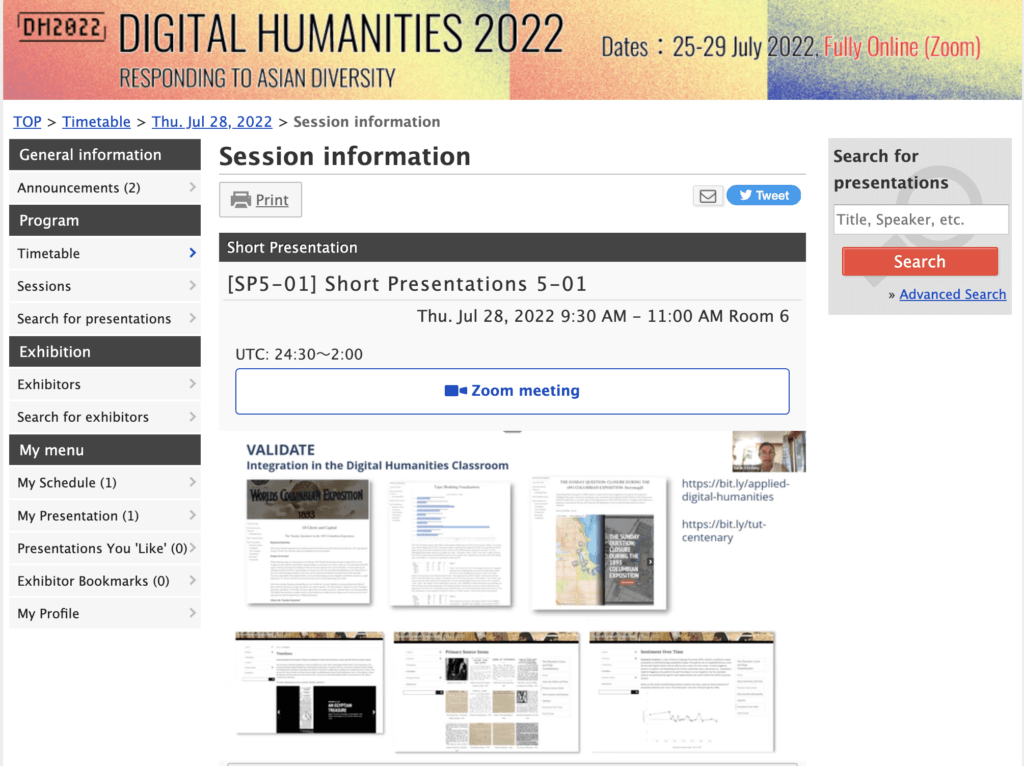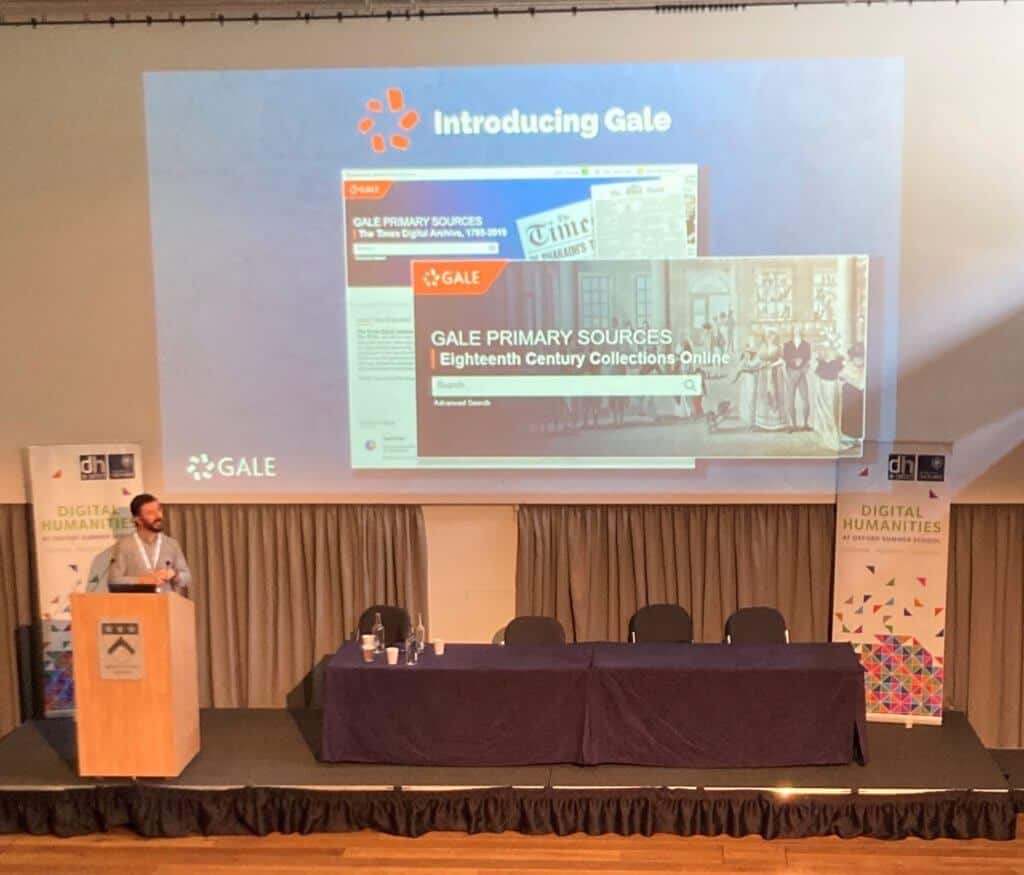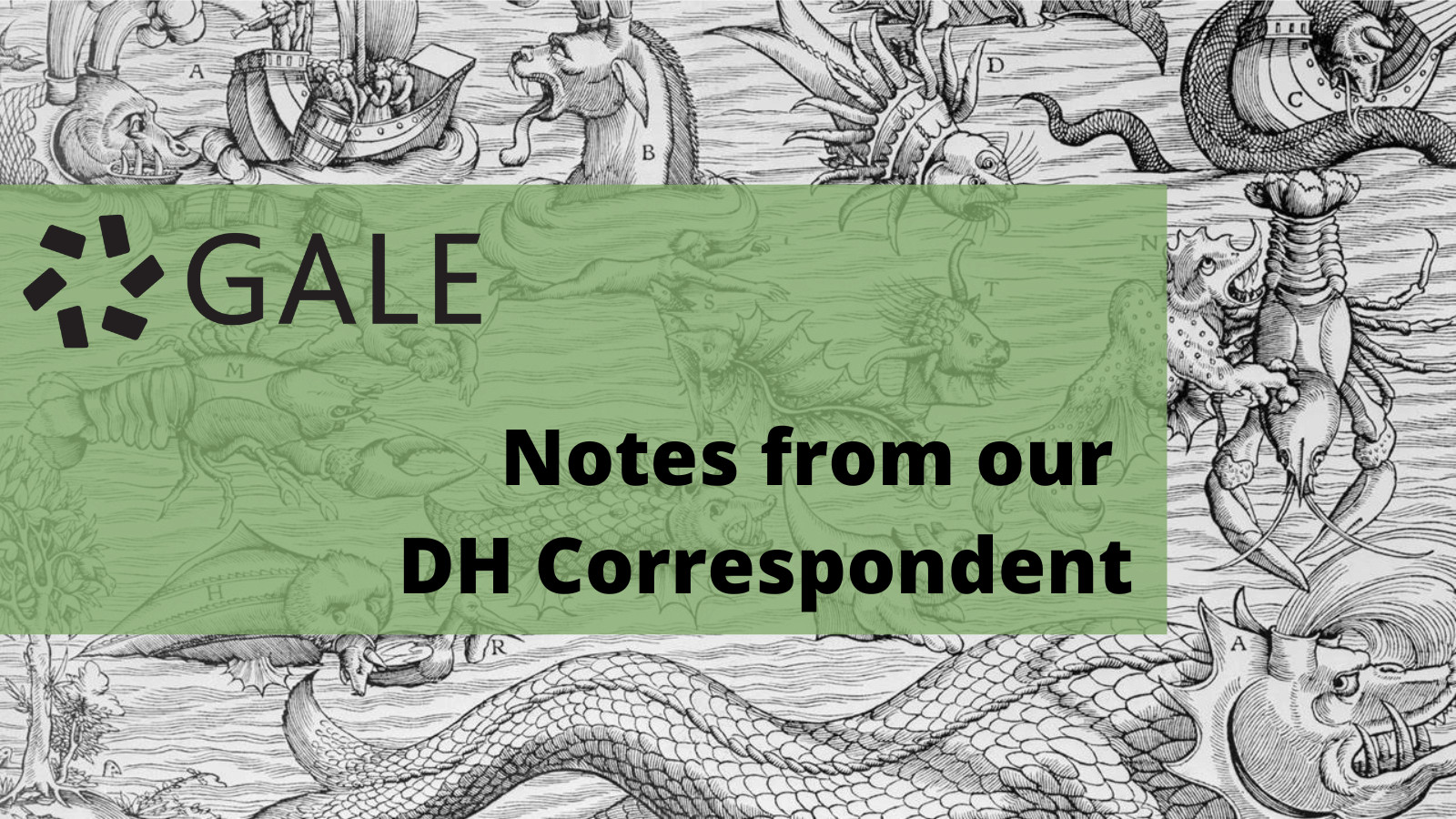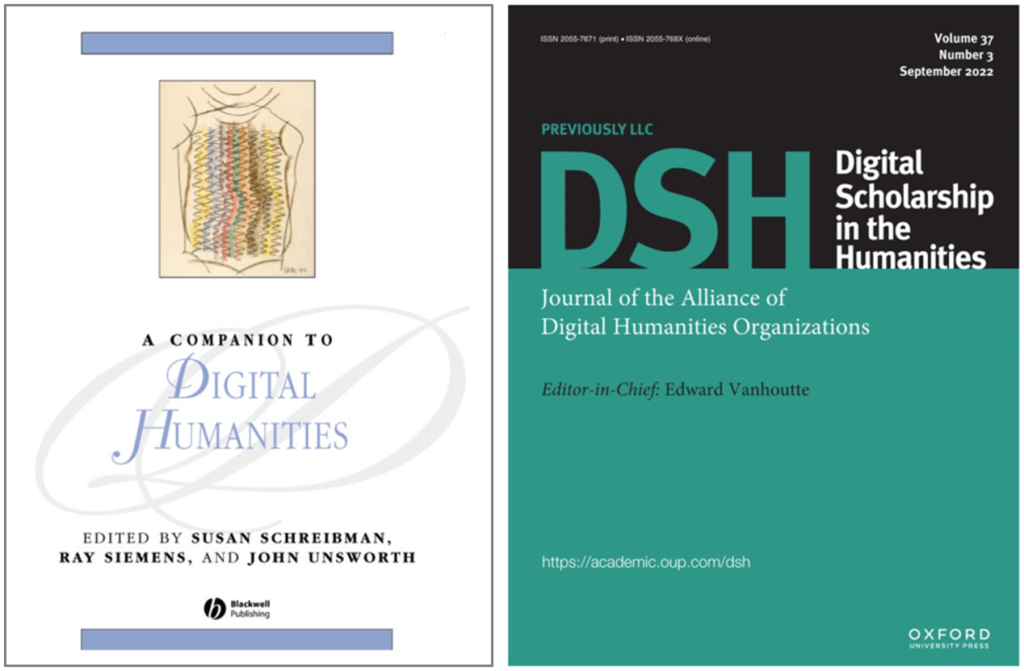│By Dr. Sarah L. Ketchley, Senior Digital Humanities Specialist, Gale │
If you speak with many Digital Humanists and discuss their route into the field, a large number will reference the training opportunities afforded by annual conferences, institutes, and workshops. These events provide a forum to develop new skills, with opportunities for hands-on practice. At the same time, attendees can learn about current project work, digital tools and methodologies and, importantly, these events provide an opportunity to mingle with peers. Digital Humanities conferences are somewhat unique in that they attract audiences from many academic disciplines, who all share the common interest of incorporating methods of digital scholarship into their research or pedagogical workflow. The Digital Humanities team at Gale is no exception, with many of us attending conferences, since our goal is to continue the ongoing development of Gale Digital Scholar Lab to ensure that it’s a relevant, functional and user-friendly platform. Many of the conferences have continued in an online format over the past couple of years, with a gradual shift back to in-person or hybrid gatherings.
As well as highlighting some of the main conferences and publications to be aware of as a Digital Humanist, this post will provide a range of resources for training, also sharing other useful networks like the Digital Humanities Slack channel. It’s not exhaustive but will provide a good starting point for those who wish to start their DH journey, brush up on existing skills, or learn about current research.

Pathways into Digital Humanities
As well as my role as Senior Digital Humanities Specialist at Gale, I am also based at the University of Washington, where my research interests include late nineteenth and early twentieth-century accounts of Nile travel, such as diaries and letters. For the past twelve years, I have been working with teams of undergraduate interns to transcribe, encode and publish this material online within the “The Emma B. Andrews Diary Project” website. When I embarked on this work, I had an idea of what I hoped to achieve with the primary source material, i.e. an openly available web resource, but I had no idea of how to get there. My learning has been two-fold: I pursued every opportunity to join relevant workshops and trainings in Digital Humanities so that I could learn how to prepare my texts for online publication, and I’ve also learned from my students, who have contributed in many valuable ways to project work. In talking with many other Digital Humanists, my pathway is not at all uncommon. But the good news is that the DH community is welcoming, inclusive and offers many pathways for growth and development.
Digital Humanities organisations and conferences
Starting in 1989, the annual international conference organised by the Alliance of Digital Humanities Organizations (ADHO) draws participants from around the globe, representing cross-disciplinary digital research and teaching at all stages and levels. This year’s conference (DH2022) was organised by a University of Tokyo team and offered virtually. Affiliated with the umbrella organisation are a range of single or joint association conferences:
- Association for Computers and the Humanities (ACH)
- Australasian Association for Digital Humanities (aaDH)
- Canadian Society for Digital Humanities / Société canadienne des humanités numériques (CSDH/SCHN)
- centerNet
- Digital Humanities Association of Southern Africa (DHASA)
- Digital Humanities im deutschsprachigen raum (DHd) (Digital Humanities in the German-speaking world)
- European Association for Digital Humanities (EADH)
- Humanistica, L’association francophone des humanités numériques/digitales (Humanistica)
- Japanese Association for Digital Humanities (JADH)
- Red de Humanidades Digitales (RedHD)
- Taiwanese Association for Digital Humanities (TADH)
Training
- Victoria, Canada: Digital Humanities Summer Institute, DHSI (June)
- Leipzig, Germany: Culture and Technology Summer School, DH@Leipzig (July)
- Oxford, UK: Digital Humanities at Oxford Summer School, DHOxSS (July)
- Sydney, Australia: Digital Methods Training, DHDownunder (December)
- Guelph, Canada: DH@Guelph (May)
- Ottawa, Canada: DHSITE@Ottawa
- Abu Dhabi, UAE: Winter Institute in Digital Humanities, NYU Abu Dhabi
- [rotating locations]: Humanities Intensive Teaching and Learning, HILT
Others:
- DHI Beirut
- ILiADS @Hamilton College DHi
- EDIROM DH, and beyond
Run with other organisations:
- DHSI@MLA
- DHSI@Congress
- ADHO Training Initiative/SIG: supports events around the world
- ZIM@Graz
Training groups located at
Publications
The following list provides a selection of the main publications in the field of DH. The footnotes and bibliographies of these works will provide additional resources for exploration.
Peer reviewed journals sponsored by ADHO:
- DSH: Digital Scholarship in the Humanities (Oxford)
- DHQ: Digital Humanities Quarterly (online)
- Digital Studies / Le champ numérique (Canadian)
- Journal of the Text Encoding Initiative
These two ADHO publications are freely available:
- Blackwell’s Companion to Digital Literary Studies
- Blackwell’s Companion to Digital Humanities
More in print and online:
- Digital Research in the Arts & Humanities (Routledge; 43 books as of September 2023)
- Debates in the Digital Humanities (Minnesota)
- Topics in the Digital Humanities (Illinois)
- Digital Humanities (Michigan)
Listservs
Digital Humanities Slack Channel
A great source of informal information is the DH Slack channel – there are over 50 channels to follow along with providing information about conference CFPs, jobs, and discussions about best practices for tool development, pedagogy and research.
Twitter is also an excellent source of research updates and events. Search using broad hashtags, such as #digitalhumanities, then narrow to specific methodologies, for example #gis, #textanalytics, #networkanalysis, and so on. Each conference and publication has its own account and/or hashtag to keep updated with current conversations.
Library Resources
If you’re based at a university, it’s a good idea to visit your library website to see if DH/DS LibGuides have been created by your librarians. These are always invaluable, since they highlight the collections that are available for you to work with at your institution and may also highlight local training opportunities and events.
Gale Digital Scholar Lab Team
The DH team at Gale has had a busy summer of presentations and training, and we have come away with plenty of thoughts about new directions for Gale Digital Scholar Lab.
Some highlights of the summer’s engagements include:
- Florida Digital Humanities Consortium (FLDH) where Jess Ludwig, Director of Product Management, Digital Humanities, presented on “The Digital Humanities Product Life Cycle: Lessons from Relaunching Gale Digital Scholar Lab”
- Digital Humanities Summer Institute where each team member attended training workshops and concurrent conference presentations.
- DH2022 where Sarah Ketchley and Jess Ludwig presented on “Processes and Practicalities in Developing and Sustaining a Text Mining Platform: Gale Digital Scholar Lab”
- Digital Pedagogy Institute where Sarah Ketchley and Helene Williams (University of Washington) presented on “Pathways to creating an inclusive and accessible digital humanities (DH) classroom”. Topics from this paper are discussed in last month’s “Notes from our DH Correspondent” blog post.
- Digital Humanities at Oxford Summer School where the Lab’s Product Manager, Becca Bowden, was joined by our Head of Academic Partnerships, Chris Houghton, who participated in and presented at this annual conference.
- Digital Humanities Congress 2022 where Sarah Ketchley presented on “The Emma B. Andrews Diary Project: A Case Study in Student Collaboration, Tool Development and Data Visualisation”, focusing on how to create opportunities for projects involving undergraduate students.


The team are always happy to help support researchers looking to learn more about Digital Humanities, develop a DH project, or introduce it into their classroom. For assistance, feel free to email [email protected].





